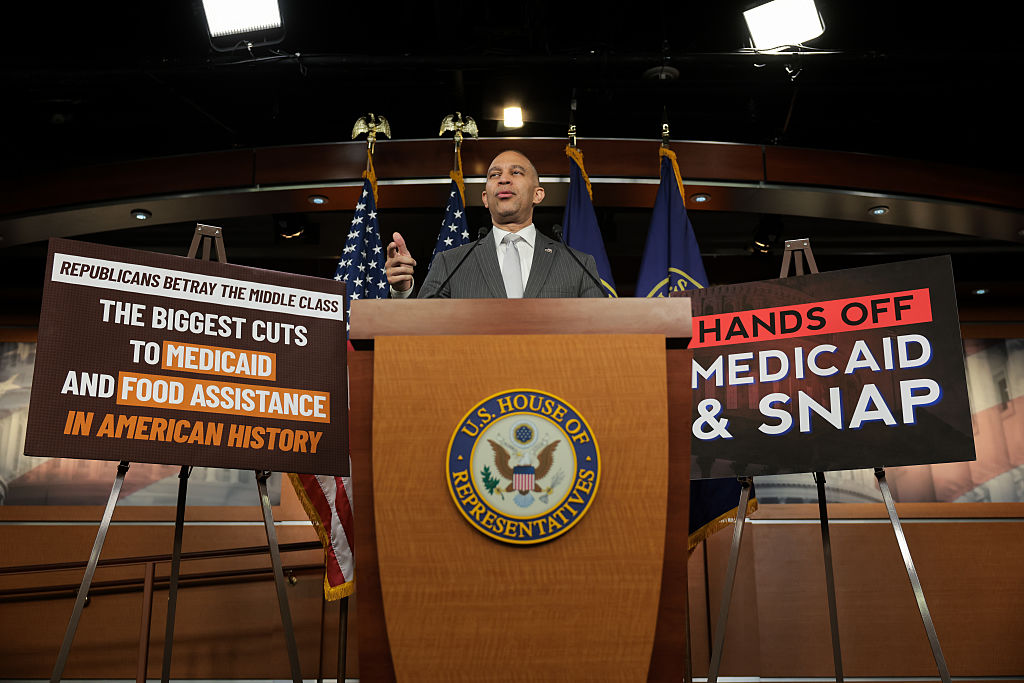
Ready to ‘Fight for the Working Class’: Sanders Endorses Abdul El-Sayed for US Senate | Common Dreams
April 17, 2025
‘Most Powerful Lobbyist in Trump’s Washington’ Cashes in on Corporate Fear
April 17, 2025When I lost my job while on maternity leave, I never expected I’d soon be in a hospital while my infant underwent emergency surgery. As my life became a high-wire act, Medicaid became a safety net for my family.
With a couple weeks left in maternity leave for my second child, I received that dreaded calendar invite from HR—no context, no agenda. I’m getting laid off, I thought.
I was the primary earner for my newly expanded family, and my six-figure salary kept us financially comfortable. When I joined the awkward Zoom call, my fears were confirmed: My position had been terminated.
It was a blow. But as I tapped into my network, I felt excited as my calendar booked up with job leads. I was hopeful—until a routine diaper change … changed everything. My infant’s diaper was filled with blood.
I went into autopilot. After 12 draining hours of visits to urgent care, the ER, an ultrasound, an X-ray and numerous blood draws, my 6-month-old was suddenly confined within a hospital room.
The hospital is a weird place. Things move both slowly and quickly. You sit in a stale room, waiting—waiting for results, waiting to talk to doctors, waiting for answers. There’s no space to think beyond each moment.
My promising work calls from just days ago were a different life. Meetings were canceled. Leads went unfollowed. My son’s health was my only concern. He continued to bleed, and we didn’t have answers.
Ten maddening days of stool collections, procedures, anesthesia and needles led to emergency surgery. We waited for the surgeon to tell us everything was fixed, but instead were shocked when she reported she hadn’t found the cause of his bleeding. The surgery had been based on an incorrect diagnosis.
American families shouldn’t go into financial ruin because a 6-month-old has a medical episode. Life gets interrupted, and it can be devastating.
The hospital discharged my son anyway. It felt like we went through a whirlwind and were thrown out the other side. We brought him home to rest and recover, but the bleeding continued.
After consulting with his GI, we made an abrupt transition from breastmilk—his only source of food (and comfort)—to an amino acid-based formula that smelled like cornstarch (and tasted disgusting). Miraculously, his bleeding stopped, and his healing began.
Although I could no longer breastfeed my baby, I was still lactating. I squeezed seven pumps a day in between formula feeds and follow-up appointments with physical therapists, GIs, allergists and dietitians. I was caring for a baby recovering from major surgery (as well as a first grader) while locked down to a breast pump for hours each day.
I was beyond any exhaustion I’d ever known. With no spare time or mental fortitude, my job search became a distant memory. But the bills kept coming. When we got on Medicaid, I breathed easier—medical costs were one thing I could take off my mental load. Our Medicaid plan provided 100 percent coverage for what would’ve been thousands of dollars in hospital and surgical bills. It covered my baby’s follow-up appointments with specialists and his prescription formula. It covered all of our basic health needs. It covered my therapy.
In the aftermath, my mental health was delicate. I tried to bounce back too quickly. I contacted my pre-hospital-days job leads: “I’m ready to go. Let’s reschedule!” But I wasn’t ready. I was depleted. In hindsight, if I’d gone back to work, I wouldn’t have performed up to my standards. It could’ve damaged my professional reputation. Because I had Medicaid, I had time to heal.
In Ron Lieber’s recent New York Times article, he wrote, “Millions of people who are financially comfortable now may be just one bad break away from needing Medicaid for themselves or a member of their immediate family.” When I read this, it felt like he was talking to me.
American families shouldn’t go into financial ruin because a 6-month-old has a medical episode. Life gets interrupted, and it can be devastating. But when you’re allowed to regroup, to rebuild, it can also be beautiful. Our country has Medicaid in place for families when they critically need support.
When I lost my job, I was presented with COBRA at the jaw-dropping cost of $3,550 a month for my family of four—more than my monthly mortgage. That’s when we switched to Medicaid. This is an expense many American families simply cannot afford. If the only healthcare options are via employment or the marketplace, it will place so many families in terrible health and financial situations.
When I was finally ready to work again, recruiters unanimously told me it could take six to 12 months to find a full-time role. I needed to generate income and support my family. Medicaid supported me in taking entrepreneurial risks. Knowing it would cover my family if we had another medical emergency gave me the time and energy to start and grow my own marketing and communications consulting business.
When infrastructure is in place to support American families, it not only prevents financial hardship, it also invests in our ability to work and raise healthy children (who will one day be productive and contributing American adults).

I never planned for my family to go on Medicaid, but I’m forever grateful it was there for us in 2024. I’m proud that the taxes I pay sustains this fabric of support and collective success in our country.
While my family has been rebuilding our lives, our government is proposing federal cuts to Medicaid. As of November 2024, nearly one in four Americans were on Medicaid. Unemployment has remained steady at 4.2 percent, indicating the need for Medicaid has not gone away.
The recent conversations to cut Medicaid are heart wrenching—what happens to families who have a bad break like mine? I hope Medicaid is there for them.
Great Job Jessica Dean & the Team @ Ms. Magazine Source link for sharing this story.





